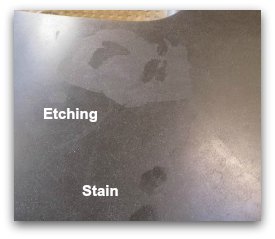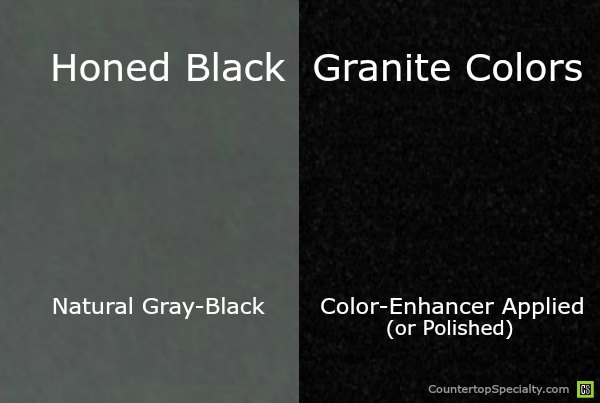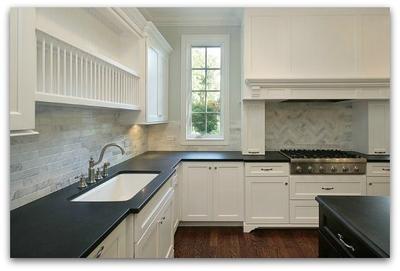Honed Absolute Black Granite
Countetops For Kitchen
QUESTION:
I've been told that honed absolute black granite countertops stain very easily by some and that this is not true by others.I really love the honed finish but before I make the plunge I would like to get advice from someone who truly knows.
Granite countertops are way too expensive to make a mistake choosing. I can settle for a polished finish if this would be the smarter choice. No problem. HELP!
ANSWER:
Yes, there are "mysteries" surrounding "stains" and black granite countertops.... and truth to both opinions.The reason you are getting two opposing answers is the result of a misapplication of the word "stain" in some instances, and also due to a few other variables associated with black granites in general.... let me explain.
Absolute Black granite may or may not stain depending on the following factors:
- The stain is not a "stain"
- It is "true" Absolute Black... or it is not
- The slab has been dyed or "doctored"
- A honed vs. polished finish
Tips About Absolute Black Granite Countertops

1. True AB granite will not stain.
Stains are dark spots from a substance absorbing into the stone. This does not occur with "true" AB granite, however, cleanable "surface" stains (see #4 below) can occur (as in photo >>>).
Trouble is actual and surface stains look the same.
Other types of spots, dull spots, white spots, water spots are often mistakenly considered a "stain".
Such spots are actually the result of an unrelated issue called "etching". This is a corrosive chemical process leaving dullish, white spots. (more on this below).
2. Not all slabs labeled "Absolute Black" are true AB granite slabs.
An unfortunate fact about the natural stone industry is that it's unregulated, so quarries and slab dealers around the world can name their stone whatever they like.
"Black" is such a popular granite countertop color and (true) "Absolute Black" has such a stellar reputation as one of the most low-maintenance, bullet-proof stones available that shady dealers can make a lot more money selling their "black-colored" granite as "Absolute Black".
Many stones are named by the specific quarry they originate from. However, there is such a wide variety of granite colors and patterns (many very similar) coming from various countries that often a slab is given a name of the closest relative.
Mis-naming or rather flexible naming is common. In general, this isn't really a fraudulent practice.
And like family, many members will bear a resemblance, but noticeably distinct. So, a Juparana Classico sitting in a warehouse in Miami will often look different (possibly a lot) than one in Dallas.
Actually, you'll see considerable variance among slabs of the same name in the same warehouse.
Buying granite countertops by name or sample is a mistake for these reasons. You need to view and pick actual slabs regardless of name.
Some in the industry try to capitalize on the well-known name "Absolute Black".
Of course, not all black granites have the same performance, so you may end up with an "Absolute Black" that really isn't.
In rare cases, black slabs contain enough calcite that they will etch like marble. Given the loose play with names, some supposed "Absolute Black" granites will naturally etch.
3. Watch out for "doctored" black granite.
Doctored black granite is a growing issue with all black granite countertops.
Shady granite factories where slabs are processed (not your local warehouse or fabricator) apply a dye to a gray granite to make it black and then sell it as "Absolute Black".
This dye (not the actual stone) will readily etch.
Again, many people mistake the whitish spots from "etching" for staining.
I know, I know.... "Etching, staining... whatever. A problem is a problem."
But now you know the difference and can better interpret other advice or information.
4. Honed vs. polished black granite cleaning
Polishing a granite countertop slab is what brings out the deep, rich color.

A honed natural black granite is typically grayish... not dark
When it gets wet, or a color-enhancing sealer is applied, then it is black just like when polished, except not a shiny finish.
I'm not a physicist, but the deeper color is due to the way it reflects light when polished or wet.
Any liquid can darken a honed "black" (actually gray) granite countertop surface so it appears black. These are temporary surface stains.
Fingerprints are the most common culprit. Fingers are oily and leave a residue on the countertop.
So you'll have a bunch of black spots on your gray granite countertop.
Again, not true "stains" and can be cleaned off. But you will be constantly cleaning.
In truth, black granite is more work to keep "looking" clean even though they are the most stain-resistant.
In fact, many varieties are so dense they're essentially impossible to stain.
However, darker granite countertop colors, and especially blacks show crumbs, dust, fingerprints, streaks and all else on the surface.
This is due to the dark color, but also the lack of pattern.
Brown, green, gold or white granite countertops (like Uba Tuba granite, Baltic Brown, Santa Cecilia granite) have more color and pattern variety (movement) which serves to hide things, so the kitchen countertops usually "look" clean even when needing a wipe-down.
Regarding stains in stone, 99% of the time we are talking about embedded stains. Stuff that absorbs into the stone below the surface creating a dark spot.
That doesn't happen with Absolute Black, however, as you've learned there is still plenty of misunderstanding about it.
The remaining 1% is what causes all the confusion.
- Oily surface stains usually from fingerprints that are easily cleaned.
- Etch marks due to a doctored granite. Big problem requiring chemical stripping.
- Etch marks due to a calcitic stone. Rare, but must have pro re-finish. (Usually it's doctoring to blame.)
Sealing Honed Absolute Black Granite Countertops
Applying a granite sealer won't help you with these surface stains for two reasons:
- Impregnating sealers work below the surface to keep liquids from absorbing.
Also, standard sealers will not change the gray color of a honed "black" stone. So, fingerprints will still show. - Absolute black is too dense to effectively apply an impregnating sealer and may just cause streaks. Most black granites will not need sealing. Although when honed such stones often can take a sealer.
This will eliminate the "surface" stain problem since the enhancer turns the countertop black. Thus, fingerprints and spills aren't noticeable.
Purely from a cleaning standpoint, a honed black granite countertop is more work... more wiping.
Applying a color-enhancing sealer will improve this situation with the added benefit of creating the flat "black" countertop look that is a favorite kitchen design style.
True... "gray" is gaining popularity and quickly becoming the new "black" such that a grayish honed AB countertop is very stylish.
But obviously... I'd think twice about leaving it gray.
Polished absolute black countertops require the least maintenance. It will still require extra wiping compared to other granite countertop colors, but you'll have the most bullet-proof, low-maintenance stone you can buy period.
You won't need to seal it and can't stain it. Just clean and maintain it with a good Granite Countertop & Marble Cleaning spray and it will look fantastic forever.
Tips for Buying Black Granite Countertops
Before you buy any black granite slab, make sure you are not getting a "doctored" slab or a stone that will etch.
Black granites that etch (become dull or leave water spots and glass rings from exposure to acid) have been doctored or (rarely) a stone that naturally etches due to traces of calcite.
Whatever the reason may be.... you don't want a granite slab that etches.
A true Absolute Black granite countertop will not etch whether honed or polished. So, be sure to perform the lemon juice test on a sample chipped off the exact slab you wish to buy.
It should not leave any spot at all. If it does, find another slab that doesn't. Install. Be happy.
Comments for Honed Absolute Black Granite
|
||
|
||
|
||
|
||
|
||
|
||
|
||
|
||
|
||
|
||
|
||
|
||
|
||
|
||
|
||
|
||
|
||
|
||
|
||
|
||
|
||
|
||
|
||
|
||
|
||
|
||
|
||
|
||
|
||
|
||




